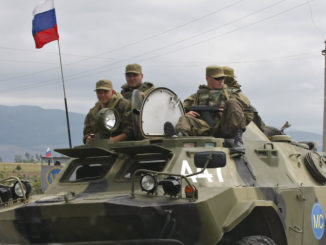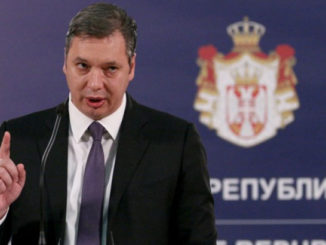
Vienna — Austria’s FM Sebastian Kurz has said that 100 years since the beginning of the First World War “we must work together to create a common European future.”
The EU enlargement is of great importance not only to countries that aspire to become EU members, but also to its member-states, he was quoted as saying.
At a press conference held on the occasion of the Conference on the Western Balkans in the 1914-2014 context, organized in Vienna by the Central European Initiative (CEI), Kurz said that one hundred years ago, the geographical map had been changed on battlefields, and now we were working together to create a common European future at a conference table.
The conference “has clear goals, which is to encourage the European perspective of the Western Balkans with a desire to send a clear signal towards awarding a candidate status to Albania and to consider opportunities for the EU member states to assist Bosnia-Herzegovina and Serbia in the reconstruction after the devastating floods.”
The European perspective is no gift at all, but rather something that is in the interest of the member countries of the Union, and therefore also Austria and its economy, said Kurz.
EU Enlargement Commissioner Stefan Fule said that the EU found political dialogue vital, pointing to the dialogue between Belgrade and Priština as a successful example.
He also expressed the hope that Albania would become an EU membership candidate very soon, Tanjug reported.
“The European Union’s doors are open to all Western Balkan states, but that it’s up to the regional political leaders to perform the necessary reforms,” he said, describing the EU, “with 28 member states and 500 million citizens” as having become “the most successful peace project” – however one that is “not finished, and there is some skepticism over the readiness of new members.”
Beta reported that Fule also said the 2003 Thessaloniki Declaration “makes it very clear that the future of the Balkans lies in the EU,” while there was “a clear consensus the entry of the Western Balkans was the only way to ensure stability and peace in that part of Europe, engulfed in conflicts for far too long.”
“The terms for crossing the threshold are clear. It is now up to political leaders to meet the expectations of their respective peoples and carry out the necessary measures – not for the benefit of Europe, but rather all citizens,” Fule was quoted as saying.
Serbian Foreign Minister Ivica Dačić said that Serbia’s interests are prosperity and all countries of the Western Balkans getting closer to European standards.
“It is obvious that we have joint interests and we should not wait for any flooding to hit us to bring us closer together,” Dačić said and called on all countries in the region to cooperate more closely.
Serbia, which is committed to entering the EU, believes that the job should be done as soon as possible and as good as possible, and this means to continue the reforms, dialogue with Priština, building regional peace and stability and a creation of a European system of values, Dačić said.
“The role of Yugoslavia, which used to bring closer peoples and states, is now being taken by the EU. This is perhaps one of the ways to overcome conflicts and calm tensions,” Dačić said.
“One hundred years ago, we waged wars. Now is the time to cooperate,” Dacic said.
Bosnian Foreign Minister Zlatko Lagumdžija said that his country played a crucial when it came to peace and stability in the region.
From a region of conflict, he said, we have become a region of cooperation, and the floods have shown that ethnic obstacles can be overcome.
Foreign Minister of Montenegro Igor Lukšić said that the EU was a mechanism of security, peace and prosperity in Europe and that the enlargement should proceed with special focus on economic cooperation.
Macedonian Foreign Minister Nikola Poposki said that despite its delays on the road to the EU, Macedonia was still working on aspects it had impact on.
Minister of Foreign Affairs of Albania Ditmir Bushati pointed out that many in the region were disappointed with the pace of the enlargement process, as all wanted to be members like Croatia.
Kosovo Deputy Foreign Minister Petrit Sellmi said that important elections are ahead for Kosovo and he hoped that the Kosovo Serbs would participate in the democratic process. (Beta, Tanjug)



